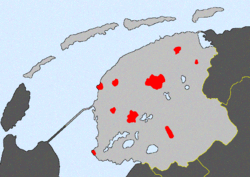City Frisian
As Stadsfries dialects a group of Dutch - West Frisian mixed dialects in different cities of the Dutch province of Friesland referred. The dialects are mostly classified as Dutch or Dutch dialects. Their emergence is usually associated with the political upheavals in 1515, but some linguists also start the development much earlier. Most of the dialects have a Dutch vocabulary and West Frisian grammar.
The designation "Stadt Frisian" is misleading insofar as it suggests that it belongs to the West Frisian language of the province of Friesland, which is not given. Nevertheless, the name Stadsfries - the language of the Frisians in the cities - has become common in Dutch usage. In Stadt Frisian one speaks of Stadsfrys , Stads or uses the respective name of the local dialect. In West Frisian, Stêdsk (“urban”) has established itself as a term that does not include any connection to Frisian. To distinguish the West Frisian of the rural rural population from the language of the urban population, the designation Boerenfries (" Farmer's Frisian ") was contrasted with the town frieze .
features
The following description refers to the dialect of the Frisian capital Leeuwarden , the Liwwadders .
vocabulary
Although this dialect has primarily a Dutch character, the West Frisian nature of speaking often breaks through. In Stadt Frisian, as in West Frisian, it is impossible to start a word with v or z (both letters are voiced fricatives in Dutch spelling ): an f or s is required. There are also countless words that occur in both West Frisian and Dutch, which have been given a correct mixed form in Stadfriesian.
There are also purely West Frisian words, especially in the field of farming (the farmers had kept West Frisian) and for things that relate to everyday life. Compare ndl. greed , west Frisian -holl. jier , ier , wfries. jarre , stfrieze. jarre 'Jauche', and ndl. vader , wfries. standardized , stfries. is called 'father'. The explanation for this is simple: at the time when it replaced West Frisian, Dutch was primarily a contact language with merchants and the language of the rich and noble people. So it did not get through in informal areas.
In addition, many words do not agree with either Dutch or West Frisian. These are (old) Dutch dialect words, e.g. B. West Frisian-Holl. hewwe , stfries. hewwe 'have' (opposite wfries. hawwe , ndl. hebben ); holl. leggen ' to lay', stfries lêge 'lie' (opposite wfries. lizze 'lie, lay', ndl. liggen 'lie').
grammar
The grammar of Stadt Frisian is largely of Frisian origin. The personal pronoun du occurs here as dou , while in Dutch it has long since disappeared. Also, the past participle is not how, in Dutch and German with overall formed: make-maakte-maakt ( "make-made-made"), and there are two infinitives, on -e and -en , side by side. The syntax is also more West Frisian than Dutch, although this is gradually changing under increasing pressure from Dutch.
Stadt Frisian, however, has not received the two classes of weak verbs that are so typical of Frisian.
Dialects
Stadt Frisian consists of different dialects that are not connected to one another. These dialects are used in Leeuwarden , Sneek , Harlingen , Stavoren , Dokkum , Bolsward , Franeker and, more recently, in Heerenveen and Kollum . Related dialects are spoken in the Terschelling village of Midsland , on the entire island of Ameland and in Het Bildt ( Bildts ), but they are not referred to as Stadt Frisian.
The main difference is the dialect of Stavoren, which has more Dutch characteristics due to its position as a Zuidersee port, and the Midslander and Ameland dialects. However, they are all to be understood among each other.
Most of the dialects have fallen back into the realm of the "common people" in the 20th century and have serious image problems. In Leeuwarden in particular, this has meant that only a few people still use the dialects: here only around 20 percent of the population still frequently speak urban Frisian. Sometimes children are simply raised in Dutch by two parents who speak Frisian. The situation is better in other places and districts. On Ameland, 85 percent of young people are said to speak the dialect.
literature
- Cor van Bree: "City Frisian" and other non-Frisian dialects of the province of Fryslân. In: Horst H. Munske (Hrsg.): Handbuch des Frisian . Tübingen: Niemeyer 2001.
